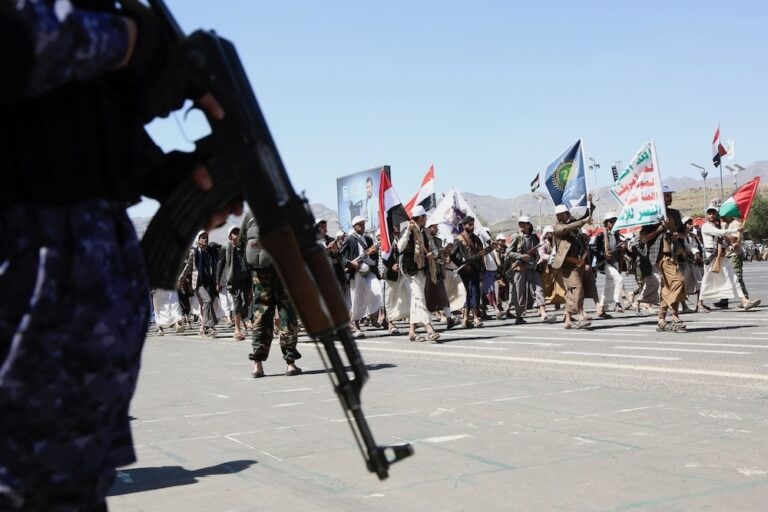"We urge the authorities to put an end to the campaign of harassment being waged against the media," said RSF.
(RSF/IFEX) – 25 March 2010 – Two illegally-held journalists have been freed in the past 24 hours on medical grounds. They are Mohamed Al-Maqalih, the editor of the opposition Socialist Party’s news website, Al Eshteraki, who was released today “for humanitarian and health reasons,” and Hisham Bashraheel, the founder and owner of the daily “Al-Ayyam”, who was released yesterday.
“We hail the release of Maqalih and Bashraheel but it is totally unacceptable that the Yemeni authorities kept them in detention without bringing any charges against them,” Reporters Without Borders said. “We urge the authorities to put an end to the campaign of harassment being waged against the media.”
Maqalih was kidnapped by five masked gunmen while returning to his home in Sanaa on the evening of 18 September. After being held incommunicado for more than 100 days, he was brought before the prosecutor of a special criminal court in Sanaa on 3 February. He said at the hearing that he had been tortured and deprived of food for several days.
A media source said he was admitted to a Sanaa hospital yesterday for treatment before being released today.
An “Al-Ayyam” journalist told Reporters Without Borders that Bashraheel, aged 66 and a diabetic, was “in a state of extreme fatigue” when he arrived at his home in Aden yesterday. “While he was held, the prison’s medical director wrote a report describing his state of health as serious,” the journalist said. “The Yemeni authorities did not free him although this information was available to them.”
Bashraheel was arrested on 6 January, after a 24-hour siege of his newspaper’s Aden headquarters by the security forces. One of his sons, Hani Bashraheel, the newspaper’s editor, was arrested at the same time. Another son, Mohammed Hisham Bashraheel, was arrested the day before.
The authorities promised to release both sons on 27 March.
Security forces previously fired on “Al-Ayyam”‘s headquarters on 13 May 2009, nine days after the information minister banned it from printing for the sake of the “country’s national unity”. The situation worsened on 15 July when one of its reporters, Anis Ahmed Mansur Hamida, was sentenced to 14 months in prison for “attacking national unity” and “separatism” at the end of a politically-motivated trial. He remains in prison.
An independent daily created in 1958 and based in Aden, “Al-Ayyam” is one of Yemen’s most important newspapers. It has no political affiliation but acts as the mouthpiece of the inhabitants of the southern provinces and in recent months has provided detailed coverage of the demonstrations taking place in what is the country’s poorest region.


